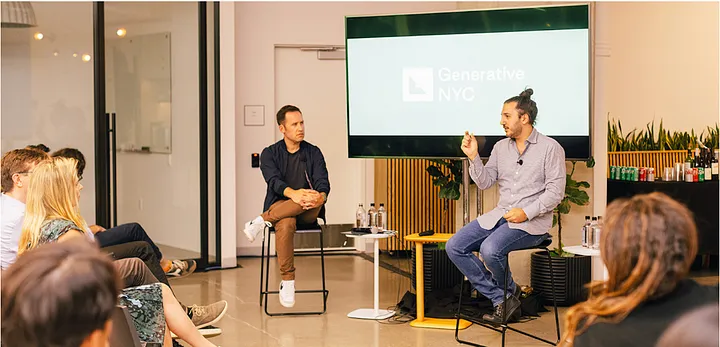05/26/2023
Consumer
How Founders Can Spot the Next Big Opportunity in AI
Spotify’s VP of Personalization believes there is one underrated trait that all founders need for success.

Lightspeed recently hosted the first ever Generative NYC meetup for an audience of operators and investors in the generative AI ecosystem. The featured speaker was Ziad Sultan, VP of Personalization at Spotify, interviewed by Lightspeed Partner Michael Mignano.
Ziad and his team are directly responsible for the algorithmic features that enable Spotify to program playlists and create audio discovery for each individual user, as well as the new AI DJ, which recently launched to much excitement.
In this excerpt from their wide ranging conversation at our offices near Union Square, Ziad tells Michael the one trait he believes founders need to cultivate to help them identify the next big opportunity in the AI/ML ecosystem, or anywhere, for that mattter.
- Get notified about future Generative events here and check out our upcoming SF and LA meetups.
Michael Mignano: You’ve been a startup founder, and now you’re at Spotify. It seems clear that all of the major incumbents are going to be deeply integrating AI very, very quickly. Every day there’s a new announcement from Microsoft or Google. If you were building a startup, as many of the people in the room are today, where do you think the opportunities are for AI and startups today?
Ziad Sultan: More than any field in any other time, AI is moving so fast.
If you had asked me two years ago where we would be today, I don’t think I could have predicted this exactly. If you’d asked me three months ago where we would be today, I still think this is moving way faster than I felt it would..
So, I’m not sure that I have a specific answer. However, I can venture some advice from my startup and product days, which is that people try to find a rulebook, right? Or like a playbook. They read the blogs, they go to the panels, they listen to people on stage.
And they’re like, “Okay, well based on what those people are saying, I can reverse engineer how it’s gonna work.” But it turns out that that never works.
There is no outside playbook that you can come in and apply. So, what is it that you’re really supposed to do? Well, all these discussions, the blogs, the panels, all that stuff, can help you build some intuition. But then, what you really need to do, in my opinion, is something else:
What’s underrated is imagination. All you really need to do is try to imagine what you want the world to be in a year, two years, three years, and convince other people that that is the world we want to live in.
Because then, when you try to reverse engineer your way there, if we all believe this is where we want to be in three years, when you reverse engineer your way there, the answer will never be the same [from two different people] twice, right? It won’t be coming from outside sources — it will be coming from your unique perspective on a problem the world needs to solve.
Maybe your startup will exploit an amazing advantage in the data you have. Or maybe it will be based on the expertise you have. Or maybe your network or connections — for example, you’re the first to sell a specific something to NASA. Ultimately, when you reverse engineer from the world you want to build, you will come to the right conclusion.
And in some cases, if you’re the absolute wizard of, say, ML infrastructure right now, then maybe that’s the startup you want to do. And it’ll be really based on your expertise and your ability to see further out than other people. Whatever it is, it’ll be based on your abilities, your insights, not what other people are saying.
Recently, I was on a panel at MIT with a few other people working in ML. On one side of me was somebody who was building machine learning for agriculture. Her competitive advantage is that she understood the needs of the geneticist, and the needs of the agricultural industry, etc.
And then the other person on the panel was doing machine learning for colonoscopies. And there is little or no accessible colonoscopy imaging data, apparently. So he built a relationship with doctors where they provide the imaging and he helps them better identify polyps. But then, now that he has the imaging, he’s able to actually train models better than anyone. And now he is making something even more valuable for gastrointestinal doctors, right? The thing he really wants to build, based on his imagination of the future.
So, I don’t know that there’s any playbook in common with both of these areas, or any other. But this founder imagined what it would take to have the best, for example, gastrointestinal ML detection software. And that founder realized, “Oh, I need relationships with doctors, and I can offer them this in exchange. And that can get me to the future I want to build, the problem I want to solve.” And the other founder is trying to do the same thing in agriculture.
This is all a long way of saying that I think what’s underrated is imagination. Because once you imagine something, you can work your way back from it to the present day, and your answer on how to get to the future will be yours alone. I believe that’s how you identify the opportunity to build the next great startup.
Want to attend the next Lightspeed Generative meetup? Get on the notification list, and in the meantime, here’s what Lightpseed is reading, listening to, and thinking about AI.



